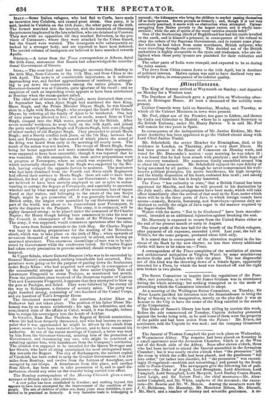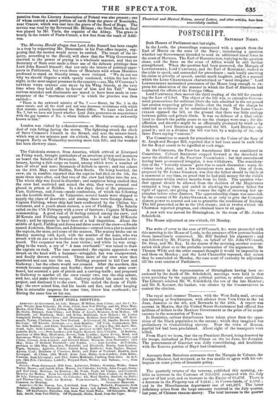Miscellaneous.
The King of Saxony arrived at Weymouth on Sunday ; and departed on Monday for a Western tour.
The Dutchess of Buccleuch gave a grand fete on Wednesday after- noon, at Montague House. At least a thousand of the nobility were present.
Cabinet Councils were held on Saturday, Monday, and Tuesday, at which all the Cabinet Ministers in town were present.
Mr. Peel, eldest son of the Premier, has gone to Lisbon, and thence by Cadiz and Gibraltar to Madrid ; where he is appointed Secretary to the British Embassy, under Mr. Henry Bulwer. It is said Mr. Peel will remain for two years in Spain.
In consequence of the indisposition of Mr. Justice Erskine, Mr. Ser- geant Atcherley has been appointed to go the Oxford circuit along with Lord Chief Justice Tindal.
Mr. Scholefield, the senior Member for Birmingham, died, at his residence in London, on Thursday, after a very short illness. He had been present in the House of Commons on Monday week, and voted for Mr. Duncombe's motion : next morning be was taken ill ; it was found that he had been struck with paralysis ; and little hope of his recovery remained. His numerous family assembled around him to cheer his last moments. Mr. Scholefield enjoyed the rare felicity of being esteemed by all parties : though he never compromised his well- known political principles, his active beneficence, his high integrity, and the kindly disposition of his heart, endeared him to all ; and among his personal friends his loss is deeply lamented.
The Times " has authority to state," that a British Consul has been appointed for Manilla, and that he will proceed to his destination by the July mail; also, that arrangements have been made, which will take effect immediately after the arrival of that mail in the East, under which there will be in the three ports of Java to which foreign vessels have access—namely, Batavia, Semarang, and Sourabaya—persons duly au- thorized to certify the origin of Java sugar in the manner required by the Sugar-duties Bill.
Wafers with the motto " Not to be Grahamed" have been manufac- tured, intended as an additional, injunction against breaking the seal.
Mr. Macready is expected to return from the United States either at the end of the present month or early in August.
The clear profit of the late ball for the benefit of the Polish refugees, after payment of all expenses, exceeded 1,0001. Last year, the ball at Willis's, for the same purpose, produced about 620/. only.
It is stated that in consequence of the alteration required in the bu- siness of the Bank by the new charter, no less than ninety additional clerks will have to be taken on.—Times.
A correspondent of the Times complains of the mutilation of statues and architectural antiquities at Virginia Water, by some mischievous modern Goths and Vandals who visit the place. The last disgraceful act of this kind was the throwing down of a female figure, apparently intended for a Flora, by which the head was knocked off and the right arm broken in two places.
The Secret Committee to inquire into the regulations of the Post- office, met yesterday, at twelve. Sir James Graham was in attendance during the whole morning ; but nothing transpired as to the mode of proceeding which the Committee intended to adopt.
At a meeting of the Wellington Statue Committee, on Tuesday, Sir Peter Laurie justified his intrusion into the Mansionhonse to bring the King of Saxony to the inauguration, merely on the plea that it was an honour to the City to have the name of the King enrolled in the annals of the Corporation.
The Duke of Sussex's library has been selling by auction this week. Before the sale commenced on Tuesday, Captain Acherley protested against the books being sold, as he said some of them were the property of the public and had been stolen from the Palace! Mr. Evans, the auctioneer, told the-Captain he was mad ; and the company threatened to eject him.
The funeral of Thomas Campbell the poet took place on Wednesday, at Westminster Abbey. The remains had been placed on Saturday in a small apartment near the Jerusalem Chamber, which is at the West end of the South aisle of the Abbey. Soon after eleven o'clock, those who had been invited to attend the funeral assembled in the Jerusalem Chamber ; but it was nearly twelve o'clock when "the procession " left the room in which the coffin had been placed, and the gentlemen " fell into order," (or rather into disorder, for "the procession" was exceed- ingly ill-regulated—mobbish and scrambling,) and passed by the South aisle to Poets-Corner. The newspapers give the following list of pall- bearers—the Duke of Argyll, Lord Brougham, Lord Aberdeen, Lord Campbell, Lord Strangford, Lord Morpeth, Lord Dudley Coutts Stuart, Lord Leigh, and Sir Robert Peel ; the chief mourners—Mr. Alex- ander Campbell, and Mr. Whiss, nephews of the deceased; the execu- tors—Dr. Beattie and Mr. W. Moxon. Among the mourners were Sir J. C. Hobhouse, Mr. Macaulay, Mr. Monckton Milnes, Mr. Disraeli, Mr. Shell, and a number of literary and scientific gentlemen. A de- potation from the Literary Association of Poland was also present ; one of whom carried a small portion of earth from the grave of Kosciusko, near Cracow, which was cast into the grave of the Bard of Hope. The service was read by the Reverend Mr. Milman ; the Dead March in Saul was played by Mr. Turle, the organist of the Abbey. The grave is nearly in the centre of Poets-Corner, a few feet from the tomb of Addi- son.
The Morning Herald alleges that Lord John Russell has been caught in a trap by supporting Mr. Duncombe in his Post-office inquiry, sup- posing that the motion would never be carried. The result of the in- quiry, according to the Herald, will show that the Whig Government resorted to the power of prying in a wholesale manner, and that no Secretary of State ever made a freer use of the delicate privilege than Lord John Russell himself; that not only the letters of political oppo- nents in Parliament, but even those of Members with whom Ministers professed to stand on friendly terms, were violated. " We do not see why we should disguise a truth openly confessed, within the last fort- night, in the most august presence in the country—ALL Ma. O'CONNELL'S LETTERS WERE OPENED AND READ by his Whig friends, at the very time when they held office by favour of him and his Tail." Some curious mistakes and disclosures are stated to have been made in con- sequence of the "enormous extent" to which the practice was then carried- " There is the awkward mistake of No. 7 — Street, for No. 5 in the same street ; and all the droll and not very decorous revelations with which that mistake actually inundated the Home Office. We know who lived at No. 7, bat we have not learnt whether Lord John prosecutes an acquaintance with the gay inmates of No. 5, whose delicate affairs became so awkwardly known to him."
London was visited by a thunder-storm on Monday evening, a good deal of rain falling during the storm. The lightning struck the clock of Saint Clement's Church in the Strand, and sent the minute-hand, which was at ten minutes past six o'clock, back five minutes, when it stopped. Early on Wednesday morning more rain fell ; and the weather has been showery since.
The Caledonia steamer, from America, which arrived at Liverpool on Friday week, brought particulars of an atrocious piracy and massacre on board the Saladin of Newcastle. This vessel left Valparaiso in Fe- bruary, having a rich cargo on board, among which were a number of bars of silver and some thousands of dollars in specie ; and ran ashore on the 20th May, near Halifax, Nova Scotia. On being boarded, the crew, six in number, reported that the captain had died on the 5th, the mate three days after, and that two of the crew had fallen into the sea. The whole ship was found in disorder ; and suspicion being excited that the crew had mutinied and seized the ship, they were arrested and placed in prison at Halifax. In a few days, three of the prisoners— Carr, Galloway, and Jones—made confessions, of which the following are the horrible details. At Valparaiso, several hands were shipped to supply the place of deserters ; and among these were George Jones, a Captain Fielding, whose ship had been confiscated by the Chilian Go- vernment, and a youth about sixteen, a son of Fielding. The Saladin sailed on the 17th February with a crew of fourteen ; Captain M'Kenzie commanding. A good deal of ill feeling existed among the crew, and M'Kenzie and Fielding openly quarrelled. It is said that M'Kenzie drank ; and he appears to have been of a bad disposition. About the middle of April, Fielding and Jones and three more of the crew—a Swede named Anderson, Hazelton, and Johnstone—entered into a plot to murder the captain, the mate, and some of the seamen. The mutiny broke out on Sunday morning 14th April, with the murder of the mate, who was struck with an axe as he reclined on the poop, and then knocked over- board. The carpenter was the next victim ; and while he was strug- gling in the water, a cry of " A man overboard I " was raised to draw the captain on deck. The ruse succeeded : the captain appeared—was struck on the bead with a hammer—struggled, but was overpowered, and finally thrown overboard. Three more of the crew were then murdered and cast into the sea. Fielding proposed to kill Carr and Galloway ; but the others would not consent. After the murders, this wretch became suspicious and fearful ; threw most of the arms over- board, but secreted a pair of pistols and a carving-knife ; and proposed to Galloway to murder all the crew except two, run the ship ashore, sink her, and make their escape. Galloway refused his assent to this project, and disclosed it to the crew. This sealed the doom of Field- ing: the crew seized him, tied his hands and feet, and after keeping him in miserable suspense for some time, threw him overboard ; in- flicting the same fate on his son.



























 Previous page
Previous page